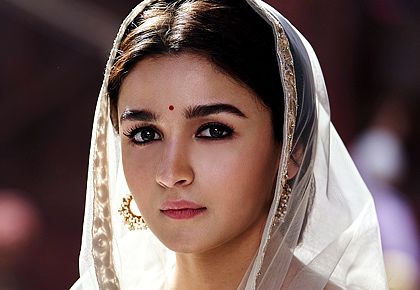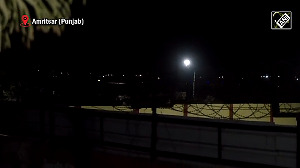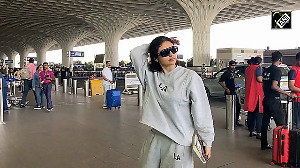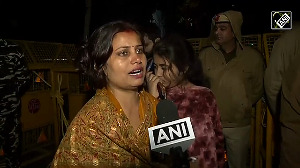... you won't feel anything either, feels Sukanya Verma.

What makes the great costume dramas of Hindi cinema so awe-inspiring is their ability to transfix and transport the viewer into another time. It could be built around fantasy or traditions but its success entirely depended on the people inhabiting this all-consuming world.
The highs have to be higher than the mountain, the lows beyond the abyss. Moderation is unacceptable to spectacle. Passion is everything. Except the language of make-believe has changed dramatically over the years and not everyone is equipped to articulate its histrionic zeal.
Kalank, the star-studded, sumptuous offering from Dharma Productions designed along the lines of a Sanjay Leela Bhansali extravaganza, only highlights this inadequacy.
Directed by Abhishek Varman (2 States), this 168-minutes long soap opera (hey there's a hat tip to Lux too), based on Shibani Bathija's story with Hussain Dalal's dialogues, is stuck in a bizarre time warp of real world and surreal treatment. What ensues is not particularly poignant, but breathtaking to behold.
Between its haphazardly fluctuating timeline -- 1944, 1946 and 1956 -- Kalank recounts forbidden love against the backdrop of caricaturish communal disharmony preceding India and Pakistan's Partition.
Given its preoccupation with grandeur though, it would be unwise to expect the horrors of history to resemble anything out of Deepa Mehta's 1947: Earth. Rather its aspiration appears to be a Pakeezah-meets-Mere Mehboob brand of coy romance harking back to a time when illegitimacy and kothas were the biggest source of infamy and obstacle.
For all its old-fashioned fervour though, the only thing old about Kalank is its dependency on out-dated tropes as well as toned and tanned bodies.
When we first meet Roop (Alia Bhatt), she's running about town in a mid-riff baring lehenga like few maidens in the 1940s would dare. Her sartorial spunk isn't the same as her spirit.
Approached by Satya with a proposal most inane, she accepts it only to regret it almost immediately. Rest of Kalank is Roop and its script compensating for that one stupid folly.
Interesting how Satya's (Sonakshi Sinha recreating the misty-eyed melancholy of her character in Lootera) mind works like Shah Rukh Khan's in Kal Ho Naa Ho sans the wit or sass.
Why Satya zeroes in on Roop is never explained nor is the mystery behind her 'want to right the wrong' statement.
Roop's arrival in a dream-like town at the outskirts of Lahore, her palatial home and Hugo-reminiscent vast window peering through the luminous landscape, followed by a lavish song and dance encounter with Bahar Begum (Madhuri Dixit) transcends her interaction with the men -- Dev, the silent type (Aditya Roy Kapoor), Balraj, the standoffish type (Sanjay Dutt) and Zafar, the philanderer type (Varun Dhawan).
There's also Kunal Khemu, wearing a kohl-eyed and taqiyah (skullcap), vowing to throw out the entitled Hindus away. The only Muslims with some conscience are, predictably enough, the nautch girl and her love child.
Suffused in luxury, Kalank's exquisitely composed frames revel in its ritzy excesses.
Lace curtains and velvet upholstery on horse carriages, cosy lotus ponds carrying quaint boats, giant harps and oversized chandeliers, regal costumes bearing intricate details, jewellery fit for a queen, ballet-inspired celebration of festivals and music, one could produce a movie in its budget for flowers and lamps alone.
Even a simple interview scene features Alia on a purple French sofa against purple walls. Kalank is that rare film where cosmetic excellence (Binod Pradhan's cinematography, Amrita Mahal Nakai's set design and Manish Malhotra's costumes) conveys more than the writing.
Interestingly, Sanchit and Ankit Balhara's background score brings to mind Thomas Newman's American Beauty.
But with not much else going on in its scheme of predictable twists and manufactured melodrama, the beauty acquires the air of a stiff spectator. Some of the songs are completely forced, especially Kriti Sanon's item number and Madhuri's big dance moment.
Kalank, if exploited for all its politics and ambiguity, has the material for a nine-part mini series. As a movie trying to cram in romance, betrayal, morality, sacrifice, virtue, ideology and tons of masala in under three hours with mostly miscast actors having to do all the heavy lifting, it feels like a lifetime.
All the pashmina in the world cannot conceal Sanjay Dutt's inherently raffish personality or his gutka-damaged dialogue delivery.
Varun Dhawan's attempt to seem fierce and sound flirty feels laughable when he's made to say lines like Apni aankhon ki kashish ko apne palkon ke aitraaz se chuppane ki koshish na karein without batting an eyelid.
Even Raaj Kumar would do a double take if asked to babble like that. His free-flowing chemistry with Alia remains caged in Kalank's stagy worldview.
While Aditya Roy Kapoor cuts a handsome picture in traditional wear, he lacks the heft that once made Jackie Shroff ideal for such parts.
Alia Bhatt is a compelling actress at all times. But one never gets a true sense of who she is between her transformation from perplexingly impulsive to flimsily love-struck.
An ethereal Madhuri Dixit is the only one who doesn't look out of place in Kalank's ada-heavy atmosphere. Her wistful gaze and classical disposition picks the sur of its over the top world, blends in it, dances with it.
At the end of this rather long movie, Alia asks 'What do you see in this story? Kalank or love?'
I saw beauty at its emptiest. You won't be able to look away. But you won't feel anything either.













 © 2025
© 2025